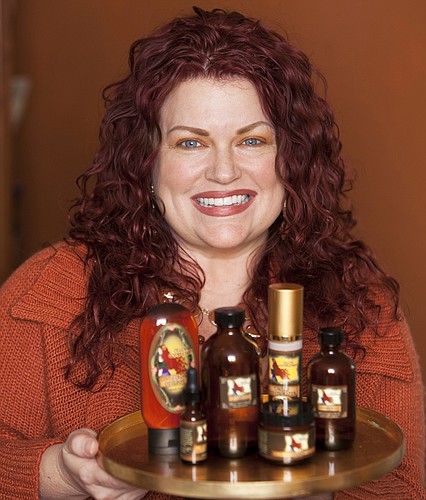- November 25, 2024
-
-
Loading

Loading

Jennifer Devlin's Tampa Bay skincare company, Celtic Complexion, may be a one-woman business, but her goal this year is one many larger firms would envy — doubling revenue.
Her strategy is to use small-budget marketing tactics to get big results. She tries uncommon campaigns, such as sponsoring Oklahoma rodeo rider Tana Poppino to reach women in the West. Devlin is paying Poppino, a champion barrel racer, $600 a month under a short-term agreement arranged by Donnell Rodeo Promotions. “She talks about my product on Facebook, she tweets about it and gives away samples,” says Devlin, adding that Poppino found her natural creams helpful for women who spend a lot of time outdoors.
In another high-profile promotion, Celtic products were included in gift bags distributed to celebrities at the Sundance Film Festival. Devlin caught the eye of Sundance marketers when she donated $10,000 worth of skincare products to victims of Hurricane Sandy. “They decided I was the type of company they wanted to include,” she says.
Devlin creates the creams and moisturizers in her Treasure Island kitchen, blending them right on the countertop. A former beauty director at Nordstrom, makeup artist for cosmetic companies, and master esthetician, Devlin carefully planned before starting her business. “I minimized all my expenses. I got debt-free,” she says.
She traded a six-figure income and generous corporate expense accounts for independence and entrepreneurship. Twice a week, Devlin works with skincare clients in Pinellas County because she enjoys the contact with customers, she says.
In 2011, the founding year, Devlin's revenue was $17,000. In 2012, it climbed to $50,000, and this year, she projects that revenue will double, to $100,000. Her products aren't cheap. On her website, a 2-ounce jar of Celtic Complexion cream made with organic shea butter, coconut oil and other ingredients, is priced at $52, plus $5 shipping and handling. From a desk in her home, she packages the incoming orders, and mails them off to clients.
The epiphany that spurred her transition from corporate cosmetics executive to independent producer of organic creams, arose when a skin specialist noticed that Devlin had rosacea, a condition that causes reddening of the skin. Devlin learned that a number of chemicals in products she was using could contributeto her rosacea. She began a quest for healthier products that led to the decision to start her own company and use pure ingredients.
Devlin promotes her products with Twitter and Facebook, welcoming reviews by beauty bloggers with large fan bases. One reviewer's 30,000 followers offer a potential mother lode for new orders. Sales in Boston, with its strong Irish-ancestry population, leapt after a newspaper wrote about the Celtic line.
Low-budget test-marketing has also been fruitful. Sites such as goodebox.com send trial-sized, eco-friendly products to subscribers.
But the main strategy for doubling revenue in 2013 is Devlin's expansion into cosmetics production. She is working with a private label to develop makeup that fits her skincare mission.
Her creams last months —good for customers, but not for a growing company that needs continual income. “I have to add products that have a much shorter shelf life,” says Devlin. The new line is in pre-production as she works with the lab on colors and her strict standards.
She has gained confidence in her products and her marketing. “The first year you're in business, you don't know where to go. You think, I'm going to throw that stuff on the wall to see what sticks.” But after two years, she is seeing results. “I know the kind of PR I need to do to get new customers. And it's always about getting new customers.”